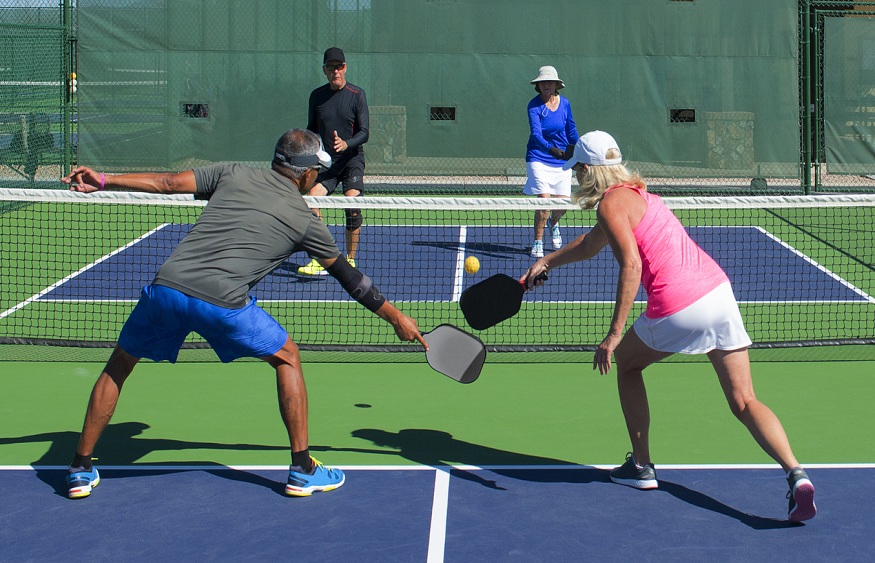Pickleball Rules: Singles vs Doubles

Welcome to the world of pickleball, a fast-growing racquet sport that combines elements of tennis, table tennis, and badminton. Pickleball is played in both singles and doubles formats, each with its own set of rules. In this comprehensive guide, we’ll delve into the differences between pickleball rules for singles and doubles, helping you understand the unique aspects of both formats.
Pickleball is played on a rectangular court with a net in the middle, similar to tennis but on a smaller scale. The game involves serving the ball diagonally, with the objective of scoring points and ultimately winning the match. The rules vary slightly between singles and doubles matches, so let’s explore the key distinctions.
Singles: The One-on-One Battle
Court Size
Singles pickleball uses a court that measures 20 feet by 44 feet, similar to the doubles court but with a smaller non-volley zone. This smaller court size requires players to cover more ground and emphasizes agility and endurance.
Serving
In singles play, the server must stand behind the baseline and serve diagonally to the opponent’s service box. The server gets one attempt at the serve, and the ball must clear the net and land in the service box.
Read more :Choosing The Right Horse Blanket For Your Horse: What You Should Know
Volley Zone
Singles players need to be aware of the non-volley zone, which extends seven feet from the net on both sides. They are not allowed to volley (hit the ball in the air) while standing inside this zone. The non-volley zone plays a significant role in the dynamics of singles play.
Scoring
Pickleball scoring in singles mirrors the traditional system, where the first player to score 11 points and lead by at least two points wins the game. Typically, a singles match consists of three games.
Doubles: Teamwork and Strategy
Court Size
Doubles pickleball uses the same court size as singles, measuring 20 feet by 44 feet. The court layout remains consistent in both formats.
Serving
In doubles play, each team has one member serve, and the service is diagonal, similar to singles. The serving team gets two attempts to serve the ball into the service box. If they fail on both attempts, they lose their turn to serve.
Volley Zone
The non-volley zone in doubles is the same as in singles, extending seven feet from the net on both sides. The difference is that in doubles, both teams need to be aware of their positioning relative to the non-volley zone.
Scoring
Pickleball scoring in doubles is slightly different from singles. Games are played to 11 points, but a team must win by at least two points. In doubles, a match usually consists of two games.
Frequently Asked Questions
Q1: Can you switch from singles to doubles in the middle of a pickleball game?
A1: No, you cannot switch formats mid-game. You must decide whether you are playing singles or doubles before the match begins.
Q2: Is serving the same in singles and doubles?
A2: The serving rules are similar in both formats, with diagonal serves required. However, there are differences in the number of attempts allowed.
Q3: How do you decide who serves first in a pickleball game?
A3: The serving team is determined by a coin toss or other agreed-upon methods before the game. The winner decides whether to serve or receive.
Q4: Are there any special rules for the non-volley zone in pickleball?
A4: The non-volley zone, also known as the kitchen, is an essential part of pickleball rules. While the rules are consistent, the dynamics of playing near the non-volley zone can vary between singles and doubles play.
Q5: What is the minimum number of players required for a pickleball doubles match?
A5: A pickleball doubles match requires a minimum of four players – two players on each team. The game can also be played with substitute players if necessary.
Conclusion
Pickleball offers fantastic versatility, accommodating both singles and doubles play. While the core rules of the game remain consistent, the format you choose can significantly impact your playing experience. Whether you opt for the intensity of singles or the teamwork of doubles, pickleball promises hours of fun and excitement on the court. So, grab your paddle, find some friends, and get ready to enjoy this engaging and dynamic sport.





